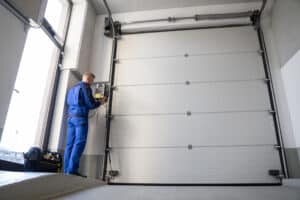How Often Should I Lubricate My Garage Door in Parker to Keep It Running Smoothly?
- Key Takeaways
- The Importance of Lubrication for Your Garage Door
- How Lubrication Protects Your Garage Door from Harsh Weather
- Lubrication for Safety and Convenience
- How Often Should You Lubricate Your Garage Door?
- Warning Signs Your Garage Door Needs Lubrication
- Choosing the Right Lubricant for Your Garage Door
- What to Avoid
- The Lubrication Process
- Trust the Experts at Select Garage Doors
Maintaining the smooth operation of your garage door is necessary for its longevity, safety, and efficiency. The weather in Parker, Colorado, can be harsh, with temperature fluctuations and dust that affect your garage door’s performance.
Whether it’s the hot summer sun or the freezing winter chill, these elements cause parts of your garage door to wear out over time. Proper lubrication helps keep all the moving parts, like hinges, rollers, and tracks, working smoothly.
At Select Garage Doors, we help homeowners in Parker maintain their garage doors and keep them in top shape throughout the year. Contact us today for professional help with maintenance and repairs!
Key Takeaways
- Regular lubrication keeps your garage door running smoothly, reduces friction, and helps extend the lifespan of components such as rollers, hinges, and springs.
- The weather in Parker can be extreme, impacting your garage door’s performance. Temperature fluctuations and high humidity contribute to wear on parts, making lubrication an important step in maintaining smooth operation.
- How often you lubricate depends on the season, the amount of use, and the age of the door. Typically, lubricating every 6 months works well, but for older doors or those in frequent use, lubrication might be needed every 3 to 4 months.
- If you hear squeaks or grinding or experience uneven door movement, it’s a sign that lubrication is needed.
- Use silicone spray for nylon rollers and white lithium grease for metal parts, and avoid products like WD-40 or automotive grease, as they don’t provide long-lasting lubrication.
- Begin by unplugging the opener, cleaning moving parts, and applying the right lubricant. Applying a small amount is best, as too much can attract dirt and debris.
The Importance of Lubrication for Your Garage Door
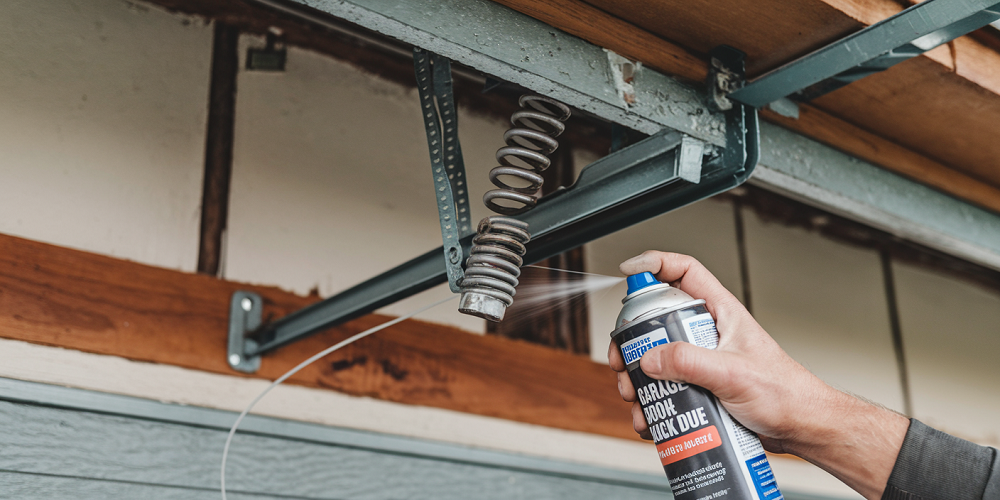 Lubrication goes beyond making your garage door operate more easily. It’s about protecting the overall health of your system. When parts such as rollers, springs, and hinges are lubricated, friction is reduced, minimizing wear. This helps extend the lifespan of your door and prevents mechanical failures that could lead to expensive repairs or even a full replacement.
Lubrication goes beyond making your garage door operate more easily. It’s about protecting the overall health of your system. When parts such as rollers, springs, and hinges are lubricated, friction is reduced, minimizing wear. This helps extend the lifespan of your door and prevents mechanical failures that could lead to expensive repairs or even a full replacement.
A well-maintained garage door in Parker runs more quietly, which is ideal if the door is near living spaces. Keeping it lubricated helps prevent squeaks and grinding sounds, helping maintain peace inside your home.
How Lubrication Protects Your Garage Door from Harsh Weather
Parker’s extreme weather conditions can impact your garage door components. Here’s how different weather affects your garage door and why regular lubrication matters for protection:
- Freezing temperatures: In winter, freezing temperatures can cause springs and rollers to stiffen or freeze. Silicone-based lubricants are perfect for these conditions, as they stay effective in low temperatures and prevent parts from sticking together.
- High humidity: Humid conditions can lead to rust on metal parts like tracks, hinges, and rollers. Using rust-resistant lubricants provides added protection, keeping the door operating smoothly.
- Extreme heat: During hot summers, parts may expand, placing extra strain on the mechanism. Using heat-resistant lubricants helps prevent damage caused by temperature changes.
Lubrication for Safety and Convenience
Regular lubrication doesn’t just improve your garage door’s performance; it also keeps things safe. If the door isn’t lubricated, parts can seize up, leading to breakdowns that could cause accidents, such as a door falling unexpectedly. By maintaining lubrication, you make sure the door opens and closes properly every time.
How Often Should You Lubricate Your Garage Door?
Lubrication needs vary depending on factors such as the season, usage, and the age of your garage door. Here’s when and how often to lubricate:
Seasonal Maintenance
- Before Winter: Lubricate your door to prevent freezing and ensure it works smoothly during cold weather.
- After Winter: Once the colder months pass, lubricate to maintain functionality and address any wear from the cold.
- During Summer: Check for any expansion or dryness in the components and lubricate as needed.
Frequency Based on Use
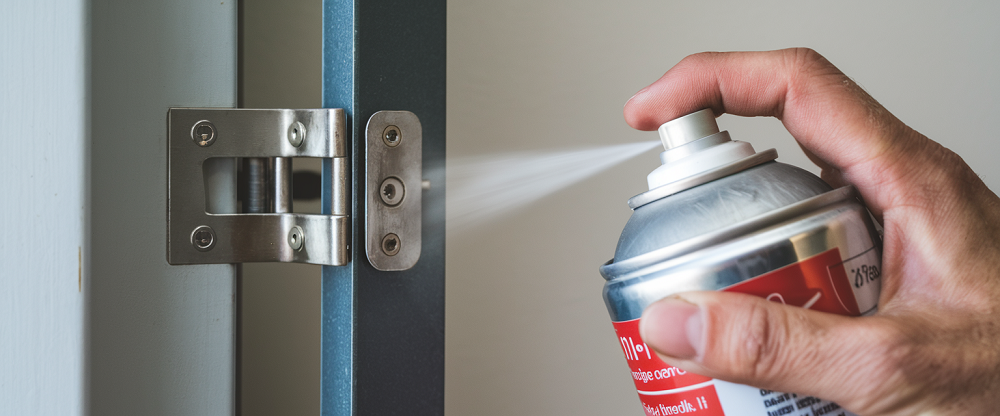 If your garage door is used frequently, like in a home with multiple cars or a business, lubrication may be needed every 3 months. For typical residential use, lubricating every 6 months should be enough.
If your garage door is used frequently, like in a home with multiple cars or a business, lubrication may be needed every 3 months. For typical residential use, lubricating every 6 months should be enough.
Age of the Door
For older garage doors (more than 10 years old), lubrication every 3 to 4 months helps to counteract the effects of wear and keep the door functioning well.
Material Type
Different materials require different lubricants. Use silicone spray for nylon or plastic rollers and white lithium grease for metal components, such as springs and hinges. For wooden doors, use minimal lubrication to avoid moisture absorption and prevent swelling.
Warning Signs Your Garage Door Needs Lubrication
Even with regular maintenance, certain signs indicate it’s time to lubricate your garage door.
Look out for:
- Squeaking or grinding noises: If your door makes these sounds, it means parts are rubbing together and need lubrication to work smoothly.
- Rust: If rust appears on metal components, apply a rust-resistant lubricant to prevent further damage.
- Jerky movement: If the door moves unevenly or struggles to open and close, lubrication is needed for smooth operation.
Choosing the Right Lubricant for Your Garage Door
Using the right lubricant is key to ensuring optimal performance.
Here are the best options for different parts:
- Silicone Spray: Great for nylon rollers and plastic parts. Silicone sprays create a non-oily, light coating that repels dirt and remains effective across a range of temperatures.
- White Lithium Grease: Best for metal parts, like springs and hinges. It provides long-lasting lubrication and excellent rust protection, especially in humid climates.
- Dry Film Lubricants: These are ideal for tracks and rollers, reducing friction while keeping components clean and ensuring smooth operation.
What to Avoid
Some products shouldn’t be used as long-term lubricants for your garage door:
- WD-40: While useful for cleaning, it doesn’t provide lasting lubrication and evaporates quickly.
- Automotive Grease: Too thick and can cause buildup, clogging the components.
- Household Oils: These oils don’t perform well in extreme temperatures and attract dirt, causing additional maintenance issues.
The Lubrication Process
Lubricating your Parker garage door is simple but must be done carefully to be effective:
- Safety First: Always unplug the opener, wear gloves, and work in a well-lit area. Use a ladder if necessary to reach higher parts of the door.
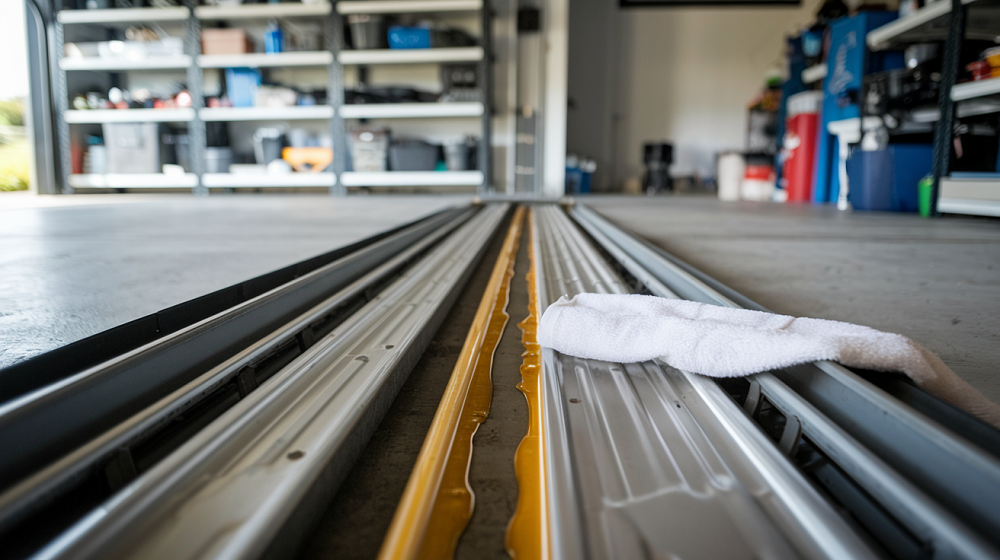 Clean the Components: Use a rag or vacuum cleaner to remove dirt and debris from the tracks, rollers, and hinges. Check for wear and damage, and dry the surfaces thoroughly.
Clean the Components: Use a rag or vacuum cleaner to remove dirt and debris from the tracks, rollers, and hinges. Check for wear and damage, and dry the surfaces thoroughly.- Apply Lubricant: Lightly spray lubricant on all moving parts, including rollers, springs, hinges, and metal contact points. A small amount goes a long way. Don’t over-apply, as it can attract dirt
- Test and Wipe: Once lubricated, reconnect the opener and test the door’s movement. If it moves smoothly, wipe off any excess lubricant to prevent dust and dirt buildup.
Trust the Experts at Select Garage Doors
Regular lubrication is key to keeping your garage door in excellent working condition. If you need help with lubrication, repairs, or installations, Select Garage Doors is ready to assist. We understand the unique weather conditions in Parker and offer the right services to keep your garage door running smoothly all year.
If you have issues with your garage door, don’t hesitate to call us today for expert advice and assistance!
REQUEST A QUOTE
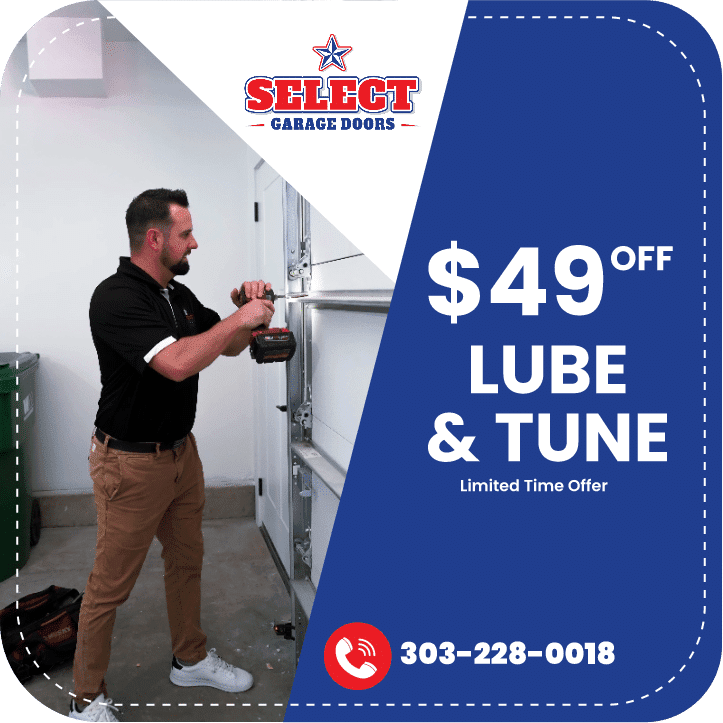
Our Services
Service Areas
Service Areas
WE SERVICE COLORADO SPRINGS, PARKER, LAKEWOOD AND SURROUNDING AREAS

 SCHEDULE A SERVICE
SCHEDULE A SERVICE
